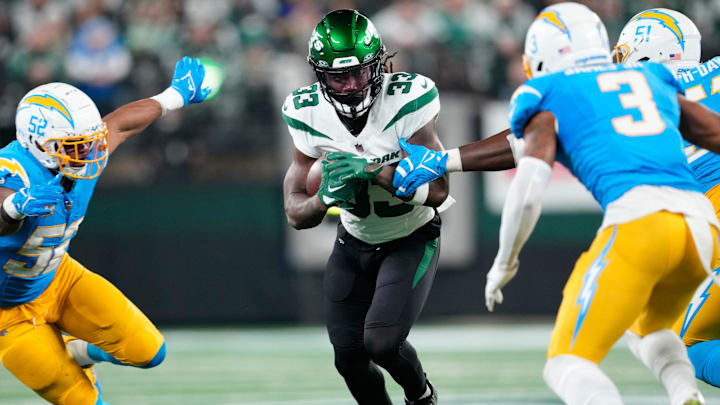The NY Jets officially agreed to part ways with veteran running back Dalvin Cook on Tuesday, ending the underwhelming tenure of a player who should have never been signed in the first place.
The Jets signed Cook this summer to serve as a complement to Breece Hall while the second-year back was still recovering from a torn ACL.
Given that Cook had made the Pro Bowl in each of the last four seasons, there was real optimism that Hall and Cook could form perhaps the most talented backfield duo in the NFL.
Unfortunately, the Jets quickly realized what many already knew before the season. Dalvin was cooked. In fact, he was cooked well before the Jets signed him.
The Cook signing was a predictable disaster from the start, and for whatever reason, Joe Douglas and the Jets were blinded by his accolades and pedigree. The organization paid for it — literally and figuratively.
The NY Jets have no one to blame but themselves for Dalvin Cook's failures
With Cook drawing interest from a number of NFL teams, the Jets jumped at the opportunity to sign the former Pro Bowl running back to a one-year, $7 million contract in mid-August. The contract made Cook the highest-paid running back to be signed that offseason.
While Cook did make the Pro Bowl for a fourth consecutive season in 2022, finishing with over 1,100 yards on the ground, his decline was evident to anyone who watched him play last year.
Cook clearly wasn't the same player he was in his prime. The explosiveness and big-play potential that he once relied on as his calling card were far less frequent than in prior seasons. The tape backed this up, as did the numbers.
Cook finished dead last among all NFL running backs in RYOE (rushing yards over expected). It was the first time in his career that he had finished with negative RYOE — a direct indication that the decline had already started.
RELATED (from July): NY Jets shouldn't be tricked by fool's gold with Dalvin Cook
Cook may be just 28 years old, but he's an old 28. The former second-round pick was a three-down back during his time in Minnesota, racking up nearly 1,300 career carries in just six seasons. Combine that with his extensive college workload and his injury history, and it was easy to see the direction his career was headed.
While Cook may not have been this bad in his final season with the Vikings, he was still arguably the most inefficient running back in the NFL. Aging running backs with a ton of tread on their tires tend to decline exponentially.
His rapid decline was as predictable as it gets in the NFL.
It's also important to consider the type of running back Cook is and has been throughout his career. He's never been a particularly effective pass blocker or receiver. He's struggled with ball security issues as well.
The reason Cook was as dominant as he was at his peak was due to his big-play ability. Cook was among the most explosive running backs in the NFL in his prime. Once that explosiveness went away, however, he offered nothing to an NFL offense.
He's a bad third-down back and has historically been bad in short-yardage situations. Dalvin Cook in 2023 does not have a role in an NFL offense. The Jets found that out later than they should have.
Cook's representatives can spin the narrative all they want following his Jets release. They can blame his lack of touches, a terrible Jets offensive line, or an inept coaching staff.
The reality is that Dalvin is cooked — and the Jets should have seem this coming.
